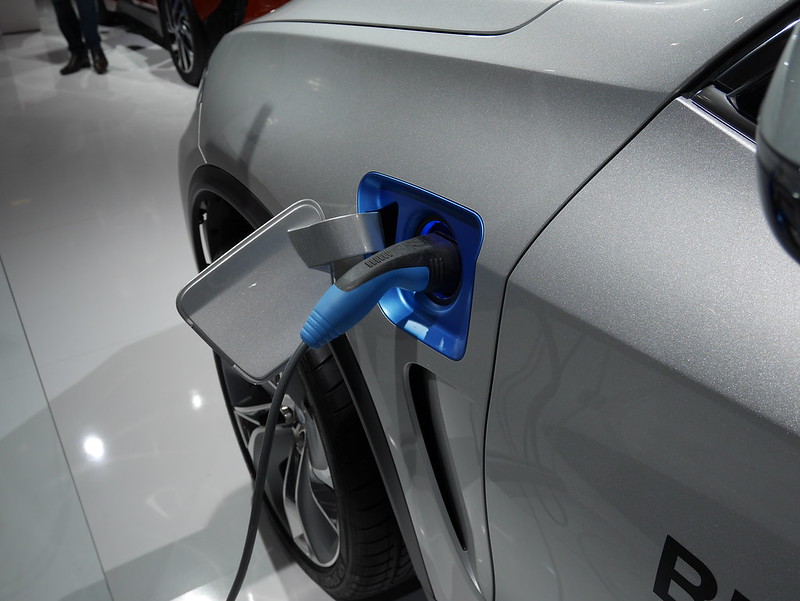
Photo: 15517757487_a49174319e_c
Plug-in hybrids can emit far more emissions than advertised, research finds
24 November 2020
by Christopher Carey
Plug-in hybrid vehicles (PHEVs) can emit up to eight times more carbon dioxide than advertised, according to research by European NGO Transport & Environment (T&E).
The study found three of Europe’s most popular PHEVs – the BMW X5, Volvo XC60 and Mitsubishi Outlander – all emitted more CO2 than advertised when tested in real-world environments.
Results appear to support previous findings from the International Council on Clean Transportation, which last year found real-world CO2 emissions from plug-in hybrids were between two to four times higher than measurements given in their approval process.
Last week the UK government announced it would allow sales of hybrid vehicles to continue until 2035 – while banning the sale of petrol and diesel vehicles from 2030.
‘Fake’ electric cars
Julia Poliscanova, T&E’s Senior Director for Clean Vehicles, said: “Plug-in hybrids are fake electric cars, built for lab tests and tax breaks, not real driving.
“Our tests show that even in optimal conditions, with a full battery, the cars pollute more than advertised. Unless you drive them softly, carbon emissions can go off the charts. Governments should stop subsidising these cars with billions in taxpayers’ money.”
The research, conducted by British firm Emissions Analytics on behalf of T&E, found the vehicles emitted 28-89 percent more CO2 than advertised when tested on a fully charged battery in optimal conditions.
On an empty battery, they emitted three to eight times more than official values, while in battery-charging mode – which could become more common as motorists charge up ahead of using electric mode in low-emissions zones – the PHEVs emitted three to 12 times more emissions.
In a statement, Graham Biggs, BMW UK’s Corporate Communications Director, told Cities Today: “The Worldwide Harmonised Light Vehicle Test Procedure (WLTP) is designed by international regulators as a standardised method of comparing vehicle efficiency to allow direct comparison between different cars and different technologies.
“These tests show clearly that PHEV technology can save significant fuel consumption and emissions over the equivalent petrol or diesel models, and the tests are conducted in a laboratory environment to ensure that all vehicles are tested in exactly the same way, under the same conditions and can be compared.
“While we cannot comment on the test method used in this report, it is no surprise that different emissions figures are reached, as on-the-road driving conditions are infinitely variable.”
A statement from Volvo said: “All Volvo cars are certified and fully comply with existing emissions legislation.
“Plug-in hybrids have zero, or close to zero, tailpipe emissions when driven in pure electric mode and our customer field data shows that Volvo plug-in hybrids are driven in pure electric mode on an average of 40 percent of the time, making them a crucial step in our path to full electrification. Plug-in hybrids are an important transitional technology on the journey towards zero-emission mobility, and an important part of the mobility portfolio of the near future.”
A spokesperson for Mitsubishi said: “Independent tests can produce unreliable/variable figures depending on conditions and a variety of other factors and we naturally contest any findings where we have no oversight of the testing or methodology.”
Greenwashing
Last week the European Union set out new guidelines for car manufactures on emission targets they would need to comply with for their activities to be classed as a ‘sustainable’ investment. Under the rules, hybrid vehicles would lose their ‘green’ label from 2026 onward.
Set to take effect at the end of 2021, the EU will define which investments can be marketed as sustainable based on criteria that they make a “substantial contribution” to tackling or adapting to climate change.
The change is being introduced to prevent so-called ‘greenwashing’ – where a company exaggerates its product or service’s environmental credentials.
In 2015, German car manufacturer Volkswagen became engulfed in a global scandal, dubbed ‘dieselgate’, when it was revealed it had cheated tests to make its vehicles appear less polluting than they were.
The fallout from the scandal has cost the firm £25 billion (US$33.2 billion) to date, following legal actions taken by dozens of countries.











